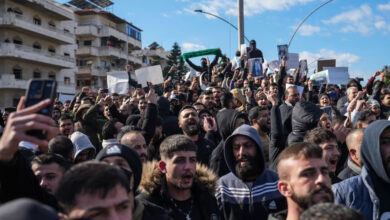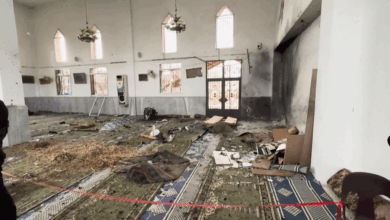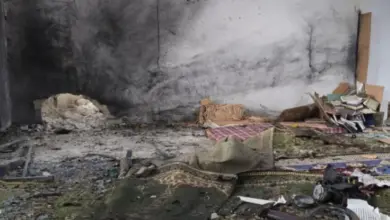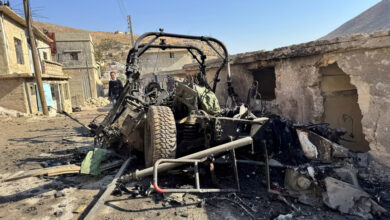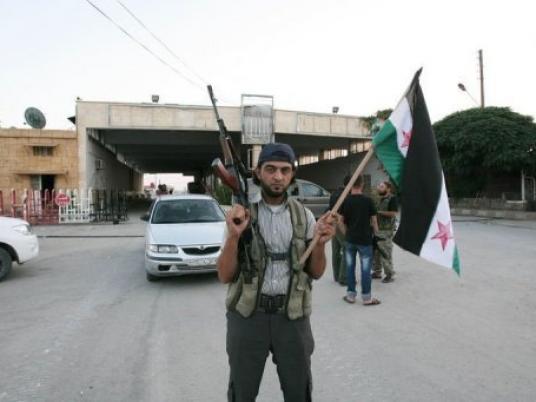
Arab nations have called on Syrian President Bashar al-Assad to swiftly give up power as his troops launched a fresh assault on rebels in Damascus and the second city Aleppo.
Fighting raged Sunday despite claims by the rebel Free Syrian Army that Assad's regime was "collapsing."
In a joint statement issued early Monday after their meeting in Doha, Arab League foreign ministers called on Assad to "renounce power," promising that he and his family would be offered "a safe exit."
"There is agreement on the need for the rapid resignation of President Bashar al-Assad," Qatar's Prime Minister Sheikh Hamad bin Khalifa al-Thani told journalists after the Arab League meeting wound up in the small hours Monday.
The Arab League called on the Free Syrian Army rebels and the opposition to form a transitional government of national unity along with the "de facto national authority," without detailing who that authority might be.
The Arab nations also called for an extraordinary meeting of the UN General Assembly to work toward creating "security zones" and "humanitarian corridors" in Syria.
The United States declared Sunday that it would "hold accountable" any Syrian official involved in the release or use of the country's chemical weapons.
Fears have been rising in the West after reports that Assad might be prepared to use his arsenal of chemical weapons to save his embattled regime.
Sheikh Hamad urged Assad to "stop the destruction and the killings by taking a courageous decision" to cede the power he has wielded since 2000.
On the ground the feared regime forces led by Assad's brother used helicopter gunships Sunday in a new assault on rebels in Damascus, activists said, as clashes also raged in Syria's second city Aleppo.
Government forces mounted an offensive in the Damascus neighborhood of Barzeh, triggering an exodus of residents, as a rebel commander appeared in a video saying the battle to "liberate" Aleppo had begun.
The official SANA news agency announced that government forces had "cleansed" the capital's Qaboon neighborhood of "terrorists," the regime's term for rebel fighters.
And state television aired footage reportedly from Qaboon showing dead bodies and weapons, communications equipment and money it said was captured from rebels.
It said some of the rebels killed held identity cards from Jordan and Egypt, accusing foreign countries of training and sending in insurgents.
But it denied helicopter gunships were being used inside the capital.
The Syrian Observatory for Human Rights said "the feared Fourth Brigade" commanded by Assad's powerful younger brother Maher was carrying out the Barzeh attack.
"Troops have stormed the northwestern Barzeh district of Damascus with tanks and armored personnel carriers," the British-based group's director Rami Abdel Rahman said, adding that snipers were deployed on rooftops.
Nationwide, 123 people were killed in violence on Sunday, 59 of them civilians, the observatory said.
The watchdog group said that more than 19,000 people have been killed since the uprising against Assad's regime began in March 2011.
The rebel Free Syrian Army's military council head General Mostafa al-Sheikh told AFP "a real war of attrition" was underway in Damascus.
"The regime is collapsing, the speed at which it is falling has increased. That means it will use greater violence in order to try and save itself," said Sheikh.
On Syria's borders, rebels battled troops for control of border crossing posts with Turkey, Iraq and Jordan, as Turkey moved batteries of ground-to-air missiles to its frontier with the Arab state.
With the violence escalating, thousands of Syrian refugees have crossed into Lebanon, Jordan and Turkey, where stone-throwing Syrians on Sunday clashed with police at two camps over a lack of food and water.
Fighting has intensified since a Wednesday bombing that killed national security chief General Hisham Ikhtiyar, Defense Minister General Daoud Rajha, Assad's brother-in-law Assef Shawkat and General Hassan Turkmani, head of the regime's crisis cell on the uprising.
Meanwhile Israel has lodged a complaint with the UN after Syrian soldiers crossed last week into the demilitarized Golan Heights zone that separates the two countries.
The Arab League's ministerial committee on Syria brings together Saudi Arabia, Egypt, Sudan, Algeria, Iraq, Kuwait and Oman.

